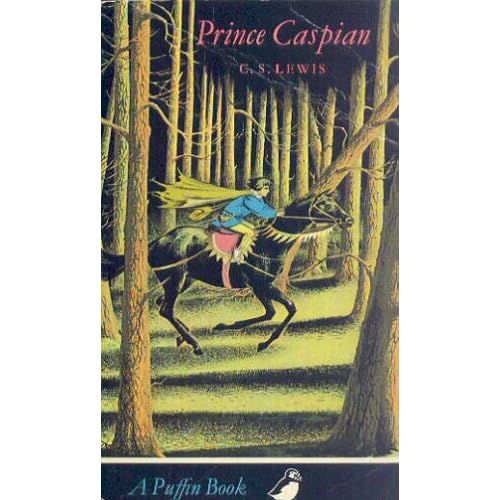Prince Caspian - C.S. Lewis

I'll admit, I skipped rereading the other parts of the Chronicles of Narnia to have a fresh remembrance of the book before seeing this movie with my son. It was great to reread it and think on Lucy's special ability to see Aslan and her difficulty working with her siblings who did not see, and I also remembered the greatness of Lewis' application of the truth of history on this world to his imaginary one; that is to say, he captures the way that great truths are often asleep in the world and at times it seems like they are lost, but they have a great way of coming back to life. Now, I suppose here is a proper place to discuss my thoughts on the movie. I thought it better than the portrayal of The Lion, The Witch, and the Wardrobe, which seemed so wooden in its film version of the book. I really enjoyed the altered sequence and expanded dialogue among the Telmarines. I did, however, feel like vomiting when artistic license lead to sparks of love between Susan Pevensie and Caspian. Especially ridiculous was her stating something to the effect of, "Oh well, it wouldn't have worked out, as I am 1300 years older than you.", whereupon they kissed prior to their departure. That almost ruined the entire movie-thankfully, almost really never was.
The Grapes of Wrath - John Steinbeck

I had long felt a void in my life for not having read this book. For whatever reason, my high school English teachers were among the few in California who didn't assign this. I had bought this book over a year ago, but like The Winter of Our Discontent, it took me awhile to actually read it. Once I got it starting, this book was a great way to reflect upon my own desires to leave one part of the country to get to California. Eerie overlaps of my fate with the Joad family have since occurred, but at the end of the day, I found this book to be far too deep for a high schooler to have read. If you read it back then, read it afresh and see what I mean. It deals with religion, sexuality, and economics on a very adult level. At the end of the day, Steinbeck offers a bleak perspective on all three of these issues, and life in general, which is fitting considering his background. Speaking of movie adaptations, I'm about one hour into John Ford's classic direction of The Grapes of Wrath. Thus far it is quite enjoyable, with crisp filmography and faithful portrayal of the struggles in the book. I will say that Henry Fonda is the worst part--he seems quite unconvincing as an Okie, but then again I think movie studios care more about big names.
Catholicism for Dummies

In my studies of Catholicism I have felt a bit stuffy from time to time as I have wrestled and grappled with authors of great intellectual weight. So it seemed fitting to step back and read a book that was designed to be simple. While simple it was still a good and fast read, covering the basics and offering defenses of particular Catholic doctrines. I'd recommend it to others interested in this subject.
The Russian Church and the Papacy - Vladimir Soloviev

Speaking of intellectual heavyweights, Vladimir Soloviev had really caught my attention when I heard about him. Contemporary of Dostoyevsky who allegedly inspired him to create the character of Alyosha Karamazov, the man was famous in Russia for having left the Eastern Orthodox churches to profess allegiance to Rome. He wrote the work used for this translation that was recently published for US readers. The book offers striking arguments for the centrality of the Bishop of Rome, using historical arguments that often include citations of Eastern Fathers. It has become clear to me from this book that the Eastern case of conciliar leadership as the root of unity fails upon historical analysis. Particularly striking was his account of the Robber Council of Ephesus and Chalcedon. It left me thinking that if it's between Rome and the East, it's no question that Rome is in the right.
St. Francis of Assisi - G.K. Chesterton

St. Francis has been intriguing to me for a long time. From his statement that runs something like "preach the gospel to every creature, and use words if necessary" to his kindness to animals, he has been mysterious to me. To read my one of my favorite authors discussing him was a true joy-he captures Francis' greatness in his own Chestertonian voice.
The Path to Rome - Hilaire Belloc
This story is thought by many (including Belloc himself) to be his greatest book. No, it is not a case defending Catholicism, though the book contains many asides on religion. The book is a collection of asides, in a sense, based on Belloc's amazing trek from France to Rome. The book made me laugh out loud so many times, as he enjoys little stories to his Lector, who complains as he writes. The joi de vivre is evident throughout the book. For a time, I thought I possibly liked his writing more than Chesterton, but I think I still have a softer spot for Chesterton. One shouldn't have to choose, so I won't really say that Chesterton is better.
Oh well, it was a great set of books for the month. June is even better. I have realized that Flannery O'Connor really is as good as so many people have said in the past.










No comments:
Post a Comment